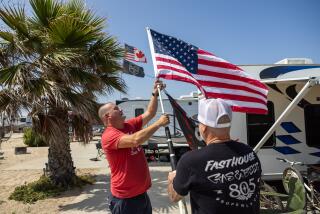Fuel costs passed to travelers
- Share via
Travelers are paying more as record-high fuel prices affect airlines, cruise lines and cabs. Among recent changes:
Several U.S. airlines, citing fuel prices, have increased fares, typically $10 to $20 round trip, on some routes. European carriers are adding on separate fuel surcharges.
Radisson Seven Seas Cruises has imposed a $2.85 daily charge per passenger to cover fuel costs and has passed along airline-imposed surcharges, recently $19 to $40 each way, to customers who booked international flights through the line.
In Los Angeles, taxicabs this month were authorized to add a 50-cent fuel surcharge, allowed when the average price of regular gasoline in Southern California reaches at least $2.22 a gallon for a full month.
Surcharges are not being imposed everywhere, at least not yet.
Carnival Corp., the world’s largest cruise conglomerate, isn’t imposing a surcharge. Higher fares, driven by demand, are covering the increase in diesel oil prices, said spokesman Tim Gallagher.
As of the Travel section’s deadline Tuesday, Greyhound Lines hadn’t raised fares, and neither had Catalina Express, which ferries passengers between the mainland and Santa Catalina Island off Southern California.
*
Bigger, better Sea Center to reopen
The Sea Center, an educational facility on Santa Barbara’s Stearns Wharf, will be reborn Saturday as an interactive marine museum.
The center, run by the Santa Barbara Museum of Natural History, has doubled in size and has had nearly $10 million of work since it shut down more than three years ago. It’s now called the Ty Warner Sea Center, after the owner of Ty Inc., the suburban Chicago-based maker of Beanie Babies, who donated $1.5 million to the project.
Once visited by nearly 70,000 people a year, the Santa Barbara facility had become dilapidated and was too small to accommodate the crowds, said its director Jenny Theodorou.
The new center will have an acrylic-walled tunnel where visitors can see waves splashing over tide-pool creatures; a 1,200-gallon tank stocked with commercial fish such as cabezon and rockfish; and computer kiosks where visitors can mimic the sounds of killer whales, dolphins and other animals.
It has a “wet deck” -- a hole carved into the wharf, where visitors and staff can send down equipment to sample water and sediment. A 7-foot-long dolphin has been preserved with polymer to display its internal organs.
Admission will be $7 for adults, $6 ages 13 to 18, $4 ages 2 to 12 and free younger than 2. It will be open 10 a.m. to 5 p.m. daily, except Saturday, when it opens at noon. Information, (805) 962-2526, www.sbnature.org/seacenter.
*
A red flag about scams in Cancun
The U.S. Consular Agency in Cancun, Mexico, has received “numerous allegations of tourists being extorted for money by taxi drivers and malfeasant police or individuals posing as police officers” in the popular resort town, the State Department said this month.
In a typical scam, it said, drivers are stopped for alleged moving violations and threatened with jail if they don’t pay a fine on the spot.
The State Department advised that a written citation should be received and that “no money should be paid directly to a police officer.”
-- Jane Engle
More to Read
Sign up for The Wild
We’ll help you find the best places to hike, bike and run, as well as the perfect silent spots for meditation and yoga.
You may occasionally receive promotional content from the Los Angeles Times.






